Difference between revisions of "Category:Salome--dance (subject)"
Jump to navigation
Jump to search

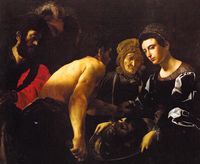
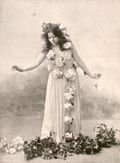
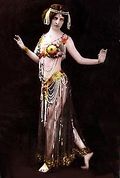

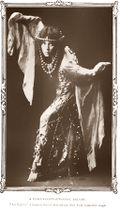


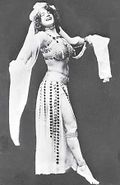
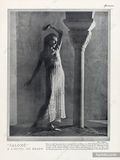
() |
|||
| Line 16: | Line 16: | ||
<''Fiction'' : [[Salome (cinema)]] -- [[Salome (music)]] -- [[Salome (literature)]] -- [[Salome (art)]]> | <''Fiction'' : [[Salome (cinema)]] -- [[Salome (music)]] -- [[Salome (literature)]] -- [[Salome (art)]]> | ||
Revision as of 03:33, 28 May 2019

Dance (Home Page)

Salome (Home Page)

Loie Fuller (1895)

Maud Allen (1906)

Gertude Hoffmann (1906)

La Sylphe (1908)

Lott Faust (1908)

Aida Overton Walker (1908)

Eva Tanguay (1908)

Ida Rubinstein (1919)
Ballets on Salome -- Salome's Dance -- Dance of the Seven Veils.
<Fiction : Salome (cinema) -- Salome (music) -- Salome (literature) -- Salome (art)>
Pages in category "Salome--dance (subject)"
The following 47 pages are in this category, out of 47 total.
1
- Dance of Salome (1462 Gozzoli), art
- Banquet of Herod (1465 Lippi), art
- Salome's Dance (1544 Ligorio), art
- Salome's Dance (1879 Gottlieb), art
- The Dance of Salome (1885 Fowler), art
- Salome (1895 Sylvestre, Pierné, Fuller), ballet
- Salome (1905 Picasso), art
- The Vision of Salome (1906 Allan), solo dance
- Tanz der Salome (Salome's Dance / 1906 Messter), short film
- If You Had a Wife Like This (1907 Biograph), short film
- Salome's Dance (1907 Dazie), solo dance
- Salome's Dance (1907 Froelich), solo dance
- Salome (1907 Gaumont), short film
- Salome (1907 Lubin), short film
- Salome; or, The Dance of Seven Veils (1908 Blackton), short film
- Salomé (1908 Capellani), short film
- Salome's Dance (1908 Faust), solo dance
- L'inconsciente Salomé (Salome / 1908 Feuillade), short film
- A Vision of Salome (1908 Hoffmann), solo dance
- The Remorse of Salome (1908 La Sylphe), solo dance
- Salome's Dance (1908 Olcott), solo dance
- Salome's Dance (1908 Overton Walker), solo dance
- Salome's Dance (1908 Tanguay), solo dance
- The Great Salome Dance (1908 Tyler), short film
- Salomé (1910 Amalou / @1908 Mariotte), Paris production (opera)
- Salome (1910 Falena), short film
- Salome (1914 Bussiere), art
- Salomé (1919 Ruhlmann / @1908 Mariotte), Paris production (opera)
- Salome (1922 Bryant), feature film
- Salome (1934 Horton, Montaya), ballet
- Salome (1937 Horton, Lewitzky), ballet
- The Dance of Salome (1949 Franca / Hartley), TV film (ballet)
- Salome; or, The Face of Violence (1953 Horton, Lavallade), ballet
- Omnibus: Salome (1955 / @1893 Wilde), TV production (play)
- Miss Salome (1955 Truitte / @1953 Horton), ballet
- Salome (1957 @1905 Strauss / Goehr), TV production (opera)
- Salomé (1969 Koralnik / @1893 Wilde), TV production (play)
- Salome; or, The Face of Violence (1973 Truitte / @1953 Horton), ballet
- Salome (1978 Davies / Flindt), ballet
- Salome (1991 Sinopoli, Malfitano / Weigl, Large / @1905 Strauss), video recording (opera)
- (+) Salome (1992 Downes, Ewing / Bailey / @1905 Strauss), video recording (opera)
- Salome (1992 Waart, Barstow / @1905 Strauss), Amsterdam production, video recording (opera)
- Salome (1997 Dohnányi, Malfitano / Bondy, Hulscher / @1905 Strauss), London production, video recording (opera)
2
- Salomé (Salome / 2002 Saura / Baños, Tomatito), film-ballet
- Salome, Spanish ed. (2005 @1893 Wilde / Narros), Seville production (play)
- Salome (2008 Summers, Mattila / @1905 Strauss), New York (Met) production, video recording (opera)
- Salome, Spanish ed. (2016 @1893 Wilde / Chávarri), Madrid production (play)
Media in category "Salome--dance (subject)"
The following 5 files are in this category, out of 5 total.
- 1918 Edwards (film).jpg 330 × 523; 93 KB
- 1945 Lamont (film).jpg 182 × 268; 23 KB
- 1953 * Dieterle (film).jpg 214 × 387; 27 KB
- 1961 Ray (film).jpg 327 × 475; 46 KB
- 1964 Pasolini (film).jpg 231 × 325; 16 KB




